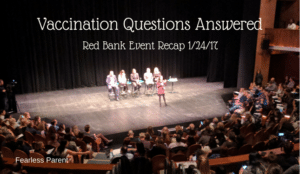To the Daily Kos blog:
In response to the article you published yesterday: “Robert F Kennedy, Jr and vaccines – why real journalists don’t interview him…”
Real journalists get the real story
And they get their facts straight, too. Tucker Carlson did credit to the profession by promoting a healthy debate about vaccine safety.
Your article, however? Not so much.
For example, Dorit Reiss totally missed the mark on vaccine manufacturer immunity and, in doing so, raised a very interesting point.
Dorit Reiss is technically correct that vaccine manufacturers don’t have “blanket immunity” from liability to vaccine-injured individuals. But since she wants to bring attention to this, let’s dig right in. Her criticism of Robert F. Kennedy Jr.’s statements to Fox’s Tucker Carlson shine a light on the poorly understood issue of vaccine manufacturer liability.
Near blanket immunity is effectively 100%
Reiss is mincing words. Vaccine manufacturers have near blanket liability immunity. Is it 100%? No. However, through the National Childhood Vaccine Injury Act (NCVIA) they enjoy a kind of legal protection that’s unprecedented, unusual, and extraordinarily difficult to challenge. The result is that many people are shut out of the process and denied justice.
First, vaccine makers are completely protected by the NCVIA against design defect claims brought by the vaccine injured. This means that these corporations cannot be sued even if, knowing their products can cause terrible harms, a safer alternative that would mitigate those harms is unavailable. Thus, legal claims cannot be brought for injury by these “unavoidably unsafe” products even if, as in the case of Hannah Bruesewitz, the products cause devastating lifelong injury.
Second, under the NCVIA the vaccine injured must first file their claims with an administrative government compensation program: the National Vaccine Injury Compensation Program (NVICP). In the NVICP, the familiar procedural safeguards that protect individual rights and operate to regulate industry are unavailable. Trial by jury is unavailable. Damages for pain and suffering are capped at $250,000. Appointed special masters have extremely broad control over the outcome of claims.
The NVICP applies against claimants who are children (< 21 years of age) the shortest statute of limitations in existence – 3 years from the onset of symptoms, with almost no exceptions, and strictly applied. In most states, minors can file claims until they turn 21 years of age. Countless claimants forfeit claims due to the three-year limitation, sometimes before they even know they have a claim. This is often due to lack of public awareness of the NVICP, which government, by its own admission, has failed to publicize because of fear that knowledge of the Program would damage vaccination uptake in the population.
The NVICP does not permit discovery of information from vaccine manufactures, except in the most unusual circumstances. Through the NVICP procedural obstacle, vaccine makers are shielded from discovery, or it is delayed, presenting an additional hurdle to poorly resourced petitioners. Discovery is the pre-trial procedure in a lawsuit in which each party in the lawsuit is entitled to evidence from the other parties by means of essential court-supported discovery mechanisms, such as depositions, interrogatories, and the request to produce certain documents. The demand for this information can be facilitated via subpoenas and court-filed motions to compel discovery. As you can imagine, this makes it very challenging for injured parties to obtain critically important information vital to building a strong legal case.
While a case can be made that the NVICP does operate to compensate some claimants who otherwise would be effectively barred from the courthouse, the Program imposes a layer of obstacles that provides powerful protection to the vaccine industry
No class actions possible
These privileged modifications to the legal system have for the most part not been helpful to people who are vaccine injured. They have, however, been very useful for those who make and administer vaccines. This kind of special legal immunity has allowed for the dismissal of large class actions filed by the vaccine injured. Let’s not forget the utility of class action lawsuits to bring about some of the most important consumer protection measures in history.
The class action lawsuit is one of the most powerful legal tools that allow those who individually lack legal firepower to bring claims as a group. By coming together, plaintiffs can muster the resources to conduct sophisticated investigations; hire the best qualified expert witnesses; and survive onerous legal processes while extracting critical information proving culpability from the manufacturers. Without class actions, only the wealthiest individual claimants can afford to sue a pharmaceutical giant and take on their high-powered, well-financed law firms. The procedural obstacles added by the NVICP serves to blunt the ability of plaintiffs to mount a class action.
Reiss is the one who is misleading
Thus, while it may not technically be “blanket” immunity, Mr. Kennedy’s substantive point about vaccine manufacturer legal protections is powerfully correct. Vaccine manufacturers enjoy the greatest legal protection against lawsuits in the history of American jurisprudence.
The examples provided by Ms. Reiss do not have merit. While the vaccine-injured can technically claim for manufacturing defects, these are almost impossible to pursue unless claimants are somehow privy to confidential and proprietary details of the production process. Vaccine manufacturers do not make this kind of information available. From a practical point of view, individuals cannot afford to bring claims to investigate manufacturing problems. Unless there is independent and thorough monitoring of manufacturing processes that alerts consumers to defects — something that, in reality, does not exist — the availability of such claims is all but meaningless.
The shingles vaccine (trade name: Zostavax) claims Reiss cites involve one of the few vaccines for which injury claims are not required to go through the NVICP. It’s the proverbial exception that proves the rule, and reveals the fundamental truth of Mr. Kennedy’s point. Zostavax, a vaccine recommended for adults over 50 years of age, is one of the very few vaccines that is widely distributed to the U.S. population and not covered under the NVICP.
Most vaccines that are given to adults and that are mandatory for schoolchildren are covered by the NVICP and are governed by the broad legal protection given to vaccine manufacturers. Flu vaccines, MMR, DTaP, and many other routinely given vaccines — the overwhelming majority — all fall under the jurisdiction of the NVICP.
The lawsuit involving the mumps component of the MMR vaccine, cited by Ms. Reiss, does not involve a person claiming injury, but rather is a claim initiated by two former Merck scientists alleging that Merck manufactured efficacy data for the mumps vaccine, covering up for the vaccine’s longstanding lack of efficacy. This example is inapplicable and in no way undermines Mr. Kennedy’s claim.
Thus, while somewhat hyperbolic — a forgivable sin for a zealous advocate when discussing truly unprecedented legal protections for an industry that promotes the most sensitive medical interventions that exist given to healthy people — Ms. Reiss’s points are far more misleading than Mr. Kennedy’s comments that she complains about.
How about a real debate on vaccine safety?
Rather than try to smear Mr. Kennedy with hyper-technical arguments that do not support her accusations, wouldn’t it be more responsible and helpful for the American consumer if we had a real debate about vaccine safety?
As a lawyer who has represented many victims of vaccine injury, I see Tucker Carlson’s interview of Mr. Kennedy as a public service encouraging a healthy debate. After all, the matter at hand is the health of our people, and mostly children. In protecting children’s health, a vigorous and open debate is always beneficial. Hollow debating points are disingenuous and do not serve anyone.
 Robert J. Krakow, Esq is the principal of the Law Office of Robert J. Krakow in New York City, focusing for more than 25 years on the trial of civil and criminal cases, with a specialty in vaccine injury cases. Prior to forming his firm, Bob was a prosecutor for the decade of the 1980’s with the New York County District Attorney’s office and served as Bureau Chief in the Office of the Special Narcotics Prosecutor for the City of New York. Bob is committed to working for individuals with disabilities, serving for 15 years as Board Chair and member of one of New York City’s largest not for profit organizations serving individuals with disabilities. He founded and/or serves/served on the boards of many prominent autism and vaccine safety advocacy organizations, including founding EBCALA, a legal advocacy organization for individuals with autism and serving on the Board of the Center for Personal Rights.
Robert J. Krakow, Esq is the principal of the Law Office of Robert J. Krakow in New York City, focusing for more than 25 years on the trial of civil and criminal cases, with a specialty in vaccine injury cases. Prior to forming his firm, Bob was a prosecutor for the decade of the 1980’s with the New York County District Attorney’s office and served as Bureau Chief in the Office of the Special Narcotics Prosecutor for the City of New York. Bob is committed to working for individuals with disabilities, serving for 15 years as Board Chair and member of one of New York City’s largest not for profit organizations serving individuals with disabilities. He founded and/or serves/served on the boards of many prominent autism and vaccine safety advocacy organizations, including founding EBCALA, a legal advocacy organization for individuals with autism and serving on the Board of the Center for Personal Rights.













Great article Robert Krakow, thank you for bringing clarity to this difficult topic !
Dear Mr Krakow,
Please listen to this Commentary reply by Gary Null Phd, founder of world’s # 1 prn.fm on The Gary Null Show on 4/ 24 (Mins 24-34.)
It includes his call to action for us to fwd his authentic, science based research, usable in any court of law, to Tucker Carlson of Fox News for his perusal & edification.
He even mentions suggesting Mr Carlson interview vaccine choice activists like you! Sounds like a plan!
BTW Dr Null also interviewed RFK. Jr last year on his show, listened to by millions in 15 countries & also sent him the above data & two more of his multi-award winning documentaries on vaccine dangers.
Keep an eye out for his latest hard hitter…coming soon!
Thanks to his inspiration & dedicated, impeccable scholarship, I & millions worldwide have learned much from this great humanitarian over the past four decades.
I also appreciated your appearance on TTAV & bought the Platinum set for my family & friends.
Thanks for your cooperation in this vital matter to protect & save humanity from this inhuman scourge of deadly vaccines!
http://prn.fm/silent-epidemic-articles-gary-null-vaccination-issue/
Hello, thank you, Deborah, I think it is unfair for the critics of vaccine safety advocates to focus on side issues, when the issue is the health and safety of our children!
Thank you also, Dohne Malkin. Gary Null is relentless in getting information out there about vaccine safety. Many of us, like you, whose focus is on children’s health agree that there is a side to the story about vaccines that is poorly understood and completely underreported.
Thank you!
Robert Krakow